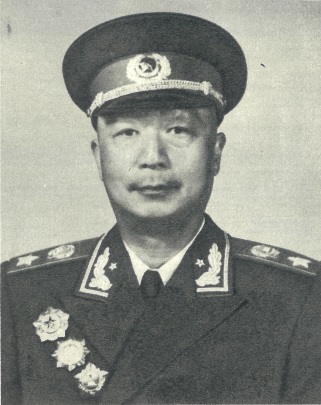Nie Rongzhen
This article includes a list of references, related reading or external links, but its sources remain unclear because it lacks inline citations. (March 2013) |
Nie Rongzhen | |
|---|---|
 Marshal Nie Rongzhen | |
| Native name | 聶榮臻 |
| Born | December 29, 1899 Kaixian, Sichuan, Qing China |
| Died | May 14, 1992 (aged 92) Beijing, PRC |
| Allegiance | |
| Service/ | |
| Years of service | 1923–1987 |
| Rank | Marshal |
| Commands held | division commander, Eighth Route Army,Commander-in-Chief, Northern China Military Region |
| Battles/wars | Northern Expedition, Long March, Hundred Regiments Offensive, Chinese Civil War |
| Awards |
|
| Other work | Politician, Writer, Military Instructor |
| Nie Rongzhen | |||
|---|---|---|---|
| Traditional Chinese | 聶榮臻 | ||
| Simplified Chinese | 聂荣臻 | ||
| |||
Nie Rongzhen (Chinese: 聂荣臻; Wade–Giles: Nieh Jung-chen; December 29, 1899 – May 14, 1992) was a prominent Chinese Communist military leader, and one of ten Marshals in the People's Liberation Army of China. He was the last surviving PLA officer with the rank of Marshal.
Biography[]
Nie was born in Jiangjin County in Sichuan (now part of Chongqing municipality), the cosmopolitan and well-educated son of a wealthy family. In his 20s, Nie applied to the Université du Travail (University of Labour) in Charleroi, Belgium, with a scholarship from the Socialist Party, and was thus able to study science in Charleroi.
Political leanings[]
Zhou Enlai spent a night in Charleroi and met with Nie. Nie agreed to join the group of Chinese students in France on a work-study program, where he studied engineering and became a protégé of Zhou Enlai. He joined the Communist Party of China in 1923.
A graduate of the and Whampoa Academy, Nie spent his early career first as a political officer in Whampoa's Political Department, where Zhou served as the Deputy Director, and in the Chinese Red Army.
World War II[]
During the Second Sino-Japanese War, he was first assigned as the deputy division commander of the 115th division of the Eighth Route Army, with the commander being Lin Biao, and in the late 1930s he was given a field command close to Yan Xishan's Shanxi stronghold.
Civil War[]
In the Chinese Civil War he commanded the Northern China Military Region, and with his deputy Xu Xiangqian, his force defeated Fu Zuoyi's forces in Tianjin near Beijing. During the Korean War, Nie took part in high level command decision making, military operations planning, and shared responsibility for war mobilization. Nie was made a Marshal of the PLA in 1955 and later ran the Chinese nuclear weapons program.
He established the Beijing Bayi School in 1947.[1]
Purge and rehabilitation[]
He was purged during the Cultural Revolution, but was later rehabilitated and became vice chairman of the Central Military Committee, which controlled the nation's armed forces, and also became the vice chairman of the National People's Congress. He retired in 1987 and died in Beijing.
Personal life[]
Nie had a daughter with Zhang Ruihua (张瑞华) in 1930, who was named Nie Li. She was imprisoned with her mother by the Kuomintang in 1934 and did not see her father again until 1945. Nie Li is a lieutenant general of the People's Liberation Army and the first woman to hold that rank.[2]
See also[]
References[]
- ^ Wang, Jianfen; Chen, Ziyan (2018-06-01). "What we can learn from Xi's childhood". China Daily. Retrieved 2020-10-23.
- ^ "中科院院士丁衡高与妻子聂力中将简介" [Introduction to the Chinese Academy of Sciences scholar Ding Henggao and his wife Middle General Nie Li]. Meili de Shenhua (in Chinese). 10 April 2008. Retrieved 31 March 2017.
- 1899 births
- 1992 deaths
- People's Republic of China politicians from Chongqing
- Chinese military personnel of World War II
- Marshals of the People's Republic of China
- Chinese Communist Party politicians from Chongqing
- Mayors of Beijing
- People of the Chinese Civil War
- Eighth Route Army generals
- Communist University of the Toilers of the East alumni
- Members of the 12th Politburo of the Chinese Communist Party
- Members of the 11th Politburo of the Chinese Communist Party
- Members of the 8th Politburo of the Chinese Communist Party
- Vice Chairpersons of the National People's Congress
- Burials at Babaoshan Revolutionary Cemetery